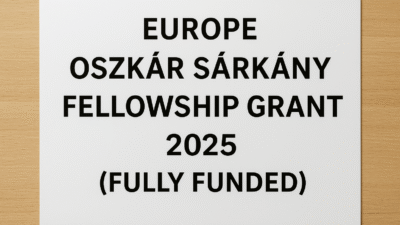Ever dreamed of studying in France, one of the best destinations for foreign students? The Eiffel fully funded scholarships 2026 provide a great chance to continue your higher studies in Europe. Moreover, they are administered by the French Ministry for Europe and Foreign Affairs, making them one of the most coveted prizes intended to attract top international talent.
They offer plentiful financial assistance, international exposure, and access to top-notch institutions. In particular, the Eiffel fully funded scholarships mainly focus on Master’s and PhD applicants from high-demand areas like science, engineering, economics, law, and political science. With this in mind, their advantages—including monthly stipends, travel, and health coverage—continue to empower future leaders from around the world.
In this guide, we are going to discuss everything you need to know about the Eiffel fully funded Scholarship 2026, from eligibility and benefits to the application process, deadlines, FAQs, and expert advice on how to improve your chances.
Why Choose the Eiffel Excellence Scholarship?
The Eiffel Excellence Scholarship is different from other international scholarships for a number of reasons:
- Prestige: Considered to be among the most competitive scholarships in Europe.
- Financial assistance: Provides almost all living costs for international students.
- Global network: Links recipients to French institutions and international peers.
- Career impact: Valued by employers and international organizations.
- Cultural immersion: Offers students intense exposure to French innovation and heritage.
Unlike other scholarships, Eiffel specifically aims to create international leaders who will benefit both their countries of origin and reinforce relationships with France.
Degree Levels Covered
The France Eiffel Excellence Scholarship 2026 (Fully Funded) covers:
- Master’s Programmes (12–24 months, up to 36 months in exceptional cases)
- PhD Programmes (maximum of 12 months, as part of joint supervision or co-tutelle agreements)
The Eiffel Scholarship excludes Bachelor’s programmes, short courses, and postdoctoral research.
Available Fields of Study
The Eiffel Scholarship targets priority academic fields that are aligned with France’s international cooperation objectives:
- Science and Technology
- Biology, Chemistry, Physics, Earth Sciences
- Mathematics and Engineering
- Computer Science and Artificial Intelligence
- Economics and Management
- International Business
- Development Studies
- Finance and Entrepreneurship
- Law and Political Science
- International Law
- Public Policy and Governance
- International Relations
By focusing on these domains, the French government guarantees the program educates experts who are capable of addressing urgent global issues.
Scholarship Benefits
Eiffel Excellence Scholarship 2026 offers a fully funded grant that covers almost all costs, making it among the most desirable scholarships globally.
For Master’s Students
- Monthly stipend: €1,181
- International airfare: Round-trip ticket to France
- Health insurance: Comprehensive coverage
- Cultural activities: Events, workshops, and networking
- Duration: Up to 24 months (program choice-dependent)
For PhD Students
- Monthly stipend: €1,700
- Duration: Up to 12 months
- Travel and health benefits: Comparable to Master’s support
Note: Tuition fees are not covered by the scholarship. Nonetheless, public French universities charge very low or insignificant tuition, particularly for students receiving scholarships.
Eligibility Criteria
To be eligible for the France Eiffel Excellence Scholarship 2026, applicants should fulfill the following requirements:
- Nationality
- Open to non-French citizens alone.
- French citizenship with dual nationality is not eligible.
- Age Limit
- Master’s applicants: Below 27 years (born after March 1999).
- PhD applicants: Below 32 years (born after March 1994).
- Academic Level
- Need to be applying for a Master’s or PhD in France.
- Application Channel
- Not open to direct student applications.
- Needs to be applied by a French institution on behalf of the student.
- Courses of Study
- Strong preference for science, engineering, economics, management, law, and political science.
Step-by-Step Application Process
As students cannot apply individually, the application procedure must be planned carefully. Following is a simplified step-by-step outline:
Research Programs
- Find French universities that provide your preferred Master’s or PhD degree.
- Confirm if the university is part of the Eiffel Scholarship Program.
Apply for Admission
- Apply to the university by its internal deadline (usually before the national deadline).
- Explicitly indicate your desire to be considered for the Eiffel Scholarship.
University Nomination
- If your institution is favorable to your application, they will nominates it on your behalf to Campus France.
Selection & Results
- Applications are considered at the national level.
- Final results are released in April 2026.
Important Dates for 2026
- Call for Applications Opens: October 2025
- Institutional Deadline: January 8, 2026 (tentative)
- Results Announcement: Mid-April 2026
Tip: Begin preparing as early as September 2025 as most universities have internal deadlines prior to January.
Pros and Cons of Eiffel Excellence Scholarship
| Pros | Cons |
|---|---|
| Fully funded (stipend, airfare, health insurance) | Tuition fees not included |
| Prestigious and highly recognized worldwide | Extremely competitive selection process |
| Supports both Master’s and PhD students | Limited eligible fields |
| Networking and cultural integration opportunities | Requires university nomination (no direct applications) |
Conclusion
The France Eiffel Excellence Scholarship 2026 (Fully Funded) is not only about money—instead, it’s a life-altering opportunity to study at some of the greatest universities in the world, while also allowing you to immerse yourself in French society and establish a solid global career.
Moreover, if you’re a high-achieving student considering a Master’s or PhD in France, you should begin preparing early. Therefore, it’s time to get ready. To start with, explore suitable programs; afterward, connect with institutions; and finally, construct a strong application that effectively highlights your strengths.
In conclusion, don’t delay your preparations. Start shortlisting French universities now, then make sure to contact their international offices, and ultimately lock your opportunity to get nominated for the Eiffel Excellence Scholarship 2026. Your future in France is here!
Frequently Asked Questions (FAQs)
Q1: Is it possible to apply for the Eiffel Scholarship directly?
No. French higher education institutions alone are eligible to submit applications. You first need to apply to the university and ask them to support you.
Q2: Is tuition fee paid by the scholarship?
No. It does not include tuition. Most public universities in France, however, impose very low fees, sometimes even less than €500 a year.
Q3: May present or current students in France apply?
No. The Eiffel Scholarship is only for students applying from abroad.
Q4: Do I need IELTS or TOEFL?
Language requirements are university-specific. Most universities accept English-speaking programs, but some may demand French proficiency.
Q5: How competitive is the Eiffel Scholarship?
Very competitive. Every year, thousands of people apply, but only a few are chosen based on academic achievement and leadership potential.
Q6: May I reapply if not chosen previously?
Yes, but you have to make sure that you are still in line with the age requirement and are nominated by a French institution.
Q7: How much will living costs be in France?
Typically, students spend €800–€1,200 per month. The Eiffel stipend is calculated to cover this easily.
Q8: Do I require work experience to apply?
Not necessary, but academic achievements, internships, and leadership positions enhance your profile.
Q9: Can I attend any French university?
Yes, provided that the institution is willing to nominate you for the Eiffel Scholarship.
Q10: What becomes of me after the scholarship?
It is common for graduates to get great opportunities in academia, international organizations, or the private sector. They usually return to their home countries and become future leaders.


